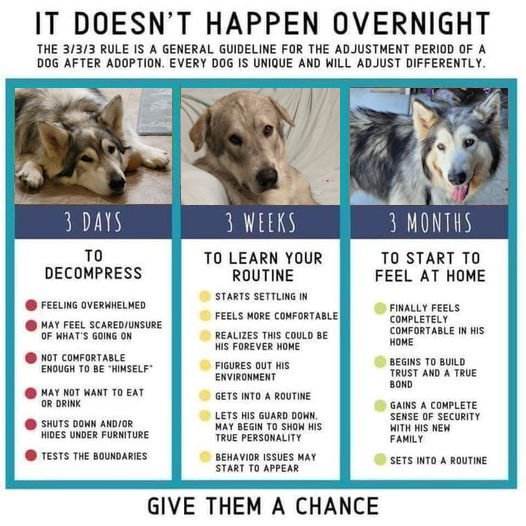Expect an Adjustment Period
Bringing a rehomed older dog into your home can be a heartwarming experience, but it's essential to recognize that it may come with challenges and require time for the dog to adjust. Just like humans, dogs need time to settle into new environments, routines, and relationships. In this article, we will explore the concept of the adjustment period when transitioning a rehomed older dog to their new home. Understanding this phase will help you provide the patience, support, and care necessary for a successful and smooth transition.
- The Importance of the Adjustment Period: For a rehomed older dog, moving to a new home means leaving behind familiar surroundings, routines, and possibly people they were once attached to. The adjustment period allows the dog to process these changes, understand their new environment, and form bonds with their new family.
- Recognizing Behavioral Changes: During the adjustment period, it's common for a rehomed older dog to display various behavioral changes. They might appear timid, anxious, or even exhibit signs of stress. Some dogs may withdraw, while others might become overly excited or exhibit destructive behaviors. Recognizing and understanding these changes is crucial for providing appropriate support and reassurance.
- Creating a Safe Space: Designate a quiet and comfortable area within your home where the dog can retreat when feeling overwhelmed. Provide a cozy bed, toys, and access to water to help the dog feel secure and at ease during this transition.
- Establishing Routines: Consistency is key during the adjustment period. Try to establish a daily routine for feeding, walking, playtime, and bedtime. Routines provide a sense of stability and predictability, helping the dog feel more secure in their new environment.
- Bonding and Building Trust: Building a strong bond and trust with your rehomed older dog is essential. Spend quality time together engaging in activities the dog enjoys, such as walks, training sessions, or gentle grooming. This will help foster a positive and loving relationship.
- Socialization and Introduction: Gradually introduce the dog to new people, pets, and environments. Keep these encounters positive and controlled, ensuring the dog does not feel overwhelmed by too many new experiences at once.
- Patience and Understanding: Every dog adjusts to change at their own pace. Be patient and understanding during this period, avoiding expectations of immediate progress. Give your rehomed older dog the time they need to settle into their new home and build confidence.
- Seek Professional Help if Needed: If you encounter behavioral challenges or signs of distress that persist beyond the adjustment period, consider seeking assistance from a professional dog trainer or behaviorist. They can provide valuable guidance and tailored strategies to address specific concerns.
Transitioning a rehomed older dog to their new home requires empathy, patience, and a willingness to accommodate their unique needs. Expecting an adjustment period is vital for understanding and supporting the dog during this transformative phase. With consistent love, care, and patience, your rehomed older dog will eventually blossom into a beloved family member, enriching your lives with loyalty, companionship, and unconditional love.
